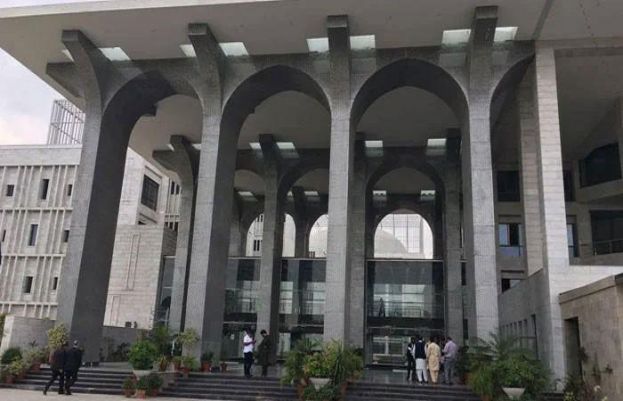A division bench of the Islamabad High Court (IHC) on Tuesday restrained its brother judge, Justice Tariq Mehmood Jahangiri, from performing judicial duties while hearing a petition challenging the validity of his LLB degree a move likely to widen existing fissures within the judiciary. The bench, comprising Chief Justice Sardar Muhammad Sarfraz Dogar and Justice Muhammad Azam Khan, also sought assistance from Attorney General for Pakistan (AGP) Mansoor Awan on the maintainability of the petition. In addition, senior lawyers Barrister Zafarullah Khan and Ashtar Ali Ausaf were appointed as amici curiae. The judges observed that until the Supreme Judicial Council (SJC) the constitutional forum for judges’ accountability delivers a verdict on the complaint against Justice Jahangiri, he cannot continue to hear cases. The petition was filed by advocate Mian Daud under a quo warranto plea. However, when the case was taken up, Daud failed to appear. His assistant informed the court that he was unavailable due to a medical emergency and sought adjournment. Meanwhile, representatives of the Islamabad Bar Association (IBA) and Islamabad Bar Council (IBC) appeared before the bench and strongly objected to the petition against a sitting judge. They insisted it was non-maintainable and urged the court to dismiss it immediately. CJ Dogar remarked that the IHC Registrar’s Office had already raised objections on the plea and no notice had yet been issued to any party, including Justice Jahangiri. He added that the matter would remain pending until the SJC reached a decision. “The central issue before the court is whether a petition under Article 199 is admissible when the matter is already sub judice before the SJC,” the CJ observed. IBC member Raja Aleem Abbasi also voiced concern, stressing that complaints against judges fall solely within the jurisdiction of the SJC, and entertaining such petitions would set a dangerous precedent. The CJ reminded Abbasi that as the IHC had not issued any notice, it could not hear argument by bar members. “The constitutional role of bars is important and they will be given a chance if the court frames questions,” he added. The bench later restrained the judge from case work. Taking exception to the order, the Islamabad Bar Council announced a strike on Wednesday (today) at both the IHC and the district court. It said a general body meeting would decide the future course of action and a rally would also be held. Sources said Justice Tariq Mehmood Jahangiri intends to challenge the decision in the Supreme Court. Following the hearing, the IHC issued a new duty roster of judges, excluding Justice Jahangiri. His division bench and single bench assignments were also withdrawn. According to the new roster, effective from September 17 to 19, three division benches and six single benches will be available. The first division bench will comprise CJ Dogar and Justice Muhammad Azam Khan. The second division bench to hear only tax-related cases will consist of Justice Babar Sattar and Justice Sardar Ejaz Ishaq Khan. The third division bench will include Justice Muhammad Asif and Justice Inaam Ameen Minhas. Single benches will consist of Chief Justice Dogar, Justice Mohsin Akhtar Kayani, Justice Saman Rafat Imtiaz, Justice Muhammad Azam Khan, Justice Muhammad Asif, and Justice Inaam Ameen Minhas. The roster was issued by the Registrar’s Office with the approval of the chief justice. On August 31, 2024, the Karachi University’s Syndicate annulled the allegedly “invalid” degree of Justice Jahangiri on the recommendations of the university’s Unfair Means (UFM) Committee. The statement issued by the university after the meeting did not mention the name of Justice Jahangiri but noted that the committee had proposed the cancellation of “the degree and enrollment cards of candidates found guilty of unethical and immoral acts.” The decision came just hours after the detention of Syndicate member Dr Riaz Ahmed, who was reportedly picked up by police in an apparent attempt to prevent him from attending the key meeting. However, the Sindh High Court (SHC) on September 5, 2024 suspended Karachi University’s decision. A division bench, comprising Justice Salahuddin Panhwar and Justice Amjad Ali Sahito, also barred the university from taking any further action on a complaint against Justice Jahangiri while hearing a petition filed by the judge.
Islamabad High Court divisions grow as judge restrained by fellow bench

